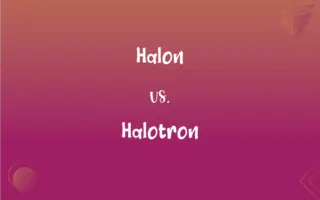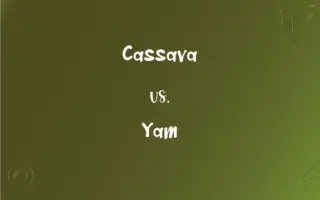Flexible vs. Versatile: What's the Difference?
Edited by Aimie Carlson || By Harlon Moss || Published on January 23, 2024
Flexible implies adaptability and willingness to change; versatile refers to having multiple skills or uses.

Key Differences
"Flexible" often describes adaptability to change, whether in plans, ideas, or materials. "Versatile," on the other hand, indicates a broad range of skills, functions, or applications, typically used to describe people or objects.
In a work environment, a flexible employee readily adjusts to new tasks or schedules. A versatile employee, however, is capable of performing a variety of different tasks effectively.
Materially, flexible refers to something that can bend or be molded without breaking, like flexible rubber. Versatile materials or products can serve multiple purposes or be used in different ways, like a versatile tool.
Flexibility is key in situations requiring quick adaptation to changing circumstances. Versatility is more about the breadth of application, useful in diverse situations or for various purposes.
In personal traits, being flexible relates to one’s ability to compromise or adapt to others' needs. Being versatile, however, refers to having a wide range of abilities or interests.
ADVERTISEMENT
Comparison Chart
Primary Meaning
Adaptable, able to change
Capable of doing many things
Usage Context
Plans, ideas, materials
Skills, functions, applications
Key Trait
Adaptability to change
Range of abilities or uses
Typical Use
Describing adaptability in behavior or materials
Describing a wide range of skills or functions
Example
Flexible schedule, flexible wire
Versatile actor, versatile tool
ADVERTISEMENT
Flexible and Versatile Definitions
Flexible
Ready to change or be adapted to different circumstances.
Her flexible approach to problem-solving was invaluable.
Versatile
Able to adapt or be adapted to many different functions or activities.
She is a versatile chef, skilled in multiple cuisines.
Flexible
Capable of bending or being modified without damage.
The flexible material made the shoes extremely comfortable.
Versatile
Having a wide range of skills or abilities.
His versatile talents made him an asset to the team.
Flexible
Able to be bent easily without breaking.
The flexible wire could be twisted into various shapes.
Versatile
Changing or fluctuating readily.
His versatile approach allowed him to adapt to new trends quickly.
Flexible
Adjustable to suit different conditions or uses.
The software's flexible features made it popular.
Versatile
Capable of turning easily from one task to another.
The versatile tool could be used for drilling, sanding, and cutting.
Flexible
Willing to compromise or adjust to others.
He was flexible in negotiations, which helped close the deal.
Versatile
Useful in many different situations.
Her versatile experience was beneficial in the diverse project.
Flexible
Capable of being bent or flexed; pliable
A flexible hose.
Versatile
Capable of doing many things competently.
Flexible
Readily bending or twisting the body without injury
You can play soccer much better if you're flexible.
Versatile
Having varied uses or serving many functions
"The most versatile of vegetables is the tomato" (Craig Claiborne).
FAQs
Is flexible mainly about physical properties?
Flexible can refer to both physical properties and adaptability in behavior or planning.
Is flexibility more about adaptation than skill?
Yes, flexibility is more related to adaptability and willingness to change rather than skill set.
Is being versatile an asset in the workplace?
Absolutely, being versatile, able to perform various tasks, is highly valued in the workplace.
Can an object be both flexible and versatile?
Yes, an object can be both flexible (adaptable in form) and versatile (useful in various ways).
Is versatility more valued in creative fields?
Versatility is highly valued in creative fields for the ability to adapt to different styles or mediums.
Can flexibility be a personality trait?
Yes, as a personality trait, flexibility refers to the ability to adapt and compromise.
Does versatile imply proficiency in multiple areas?
Yes, versatile often means having proficiency or usefulness in multiple areas or tasks.
Does versatility imply depth or breadth of skills?
Versatility implies breadth, having a wide range of skills or applications.
Can a person's mindset be described as flexible?
Yes, a flexible mindset implies openness to new ideas and adaptability to change.
Is a versatile skill set important for freelancers?
For freelancers, a versatile skill set is important to adapt to varied job requirements.
Does versatility require continual learning?
Versatility often involves continual learning and adaptation to maintain a wide range of skills.
Can versatility lead to career advancement?
Yes, versatility can lead to career advancement by enabling one to take on diverse roles.
Is being flexible important in team environments?
Being flexible is crucial in team environments for accommodating different perspectives and changes.
Does flexibility relate to emotional intelligence?
Flexibility can be a part of emotional intelligence, involving adaptability in social interactions.
Can a versatile employee handle multiple roles?
Yes, a versatile employee can effectively handle multiple roles or tasks.
Are versatile tools preferable in construction?
In construction, versatile tools are preferred for their multiple functionalities.
Can flexibility be developed over time?
Yes, flexibility, both physical and behavioral, can be developed with practice and experience.
Does a flexible approach benefit problem-solving?
Yes, a flexible approach allows for adaptability in problem-solving strategies.
Can flexibility reduce stress in changing situations?
Yes, being flexible can help manage stress in rapidly changing situations.
Are flexible policies beneficial in organizations?
Flexible policies can be highly beneficial in organizations for accommodating diverse needs.
About Author
Written by
Harlon MossHarlon is a seasoned quality moderator and accomplished content writer for Difference Wiki. An alumnus of the prestigious University of California, he earned his degree in Computer Science. Leveraging his academic background, Harlon brings a meticulous and informed perspective to his work, ensuring content accuracy and excellence.
Edited by
Aimie CarlsonAimie Carlson, holding a master's degree in English literature, is a fervent English language enthusiast. She lends her writing talents to Difference Wiki, a prominent website that specializes in comparisons, offering readers insightful analyses that both captivate and inform.








































































